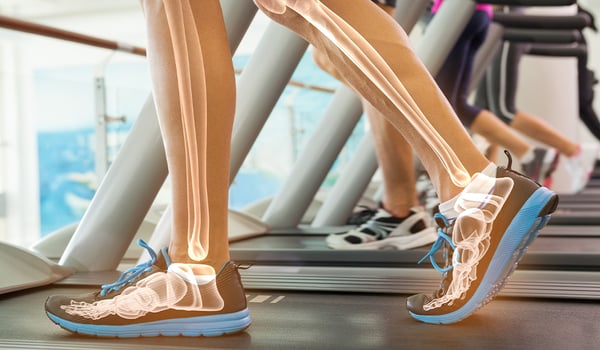The humped back. Micro-fractures in your bones. The fear of a fall.
As we age, the negative effects of poor bone health can follow us everywhere we go. Across the world, 1 in 3 women and 1 in 5 men aged 50 and above are at risk of experiencing a bone fracture. It’s all too common, and it can leave you in a state of constant worry.
Inevitably, as we age, our bones don’t rebuild the same way they used to. However, there are some simple (and surprising) actions you can take to improve your bone mineral density (or BMD). Maintaining strong bones can help prevent fractures, but can also prevent the fall that causes those fractures.
Here are 4 proven ways to improve your bone density and strength.
1. Get Outside
Most of us don’t get enough vitamin D from our diet alone, so our bodies need it from direct sunlight. This doesn’t mean you should go outside looking to get burned. If you load up on proper micronutrients (like the ones we mention in the rest of the next section), they’ll actually act as a natural sunscreen.
Allow your skin to be exposed to the sun before you start to burn, then load up on a healthy sunscreen with zinc oxide or titanium dioxide.
2. Take Extra Supplements
Exercise can improve bone density, but if you exercise regularly, you actually lose a lot of essential micronutrients, such as:
- Zinc
- Magnesium
- Calcium
Losing these micronutrients can lead to weakened bones. For example, as you exercise you sweat more, and as you sweat you release calcium. Once that calcium is gone, our body finds a new supply of it in the only place it knows to look: your bones.
This doesn’t mean you should stop exercising. Working out has immense health benefits, and its benefits grow with age. You should absolutely continue to exercise, but be sure to supplement with the following (especially if you do heavy cardio):
- Vitamin A
- Vitamin C
- Vitamin E
- Selenium
- Calcium
Although it can temporarily deplete you of micronutrients, exercise is also an essential part of building bone density. Running and weightlifting put stress on your bones, which stimulates BMD.
3. Resistance Training
When you lift weights you increase the load required to support that weight, and your bones respond by building density. This is called osteogenic loading. One study found that osteogenic loading increased bone density between 15 and 17 percent. In fact, it is such an effective way to build BMD that osteogenic loading became the official drug-free method for treating osteoporosis for the World Congress on Osteoporosis.
Your best course of action is to stick to an exercise regimen while simultaneously supplementing with the proper nutrients. You can also supplement using something called a peptide. A peptide is a chain of amino acids. They're effective supplements because they treat specific symptoms and are side effect-free. The peptide BPC-157 in particular helps increase your type 1 collagen production, which helps your body repair bone tissue.
4. Cut Your Stress
Stress and anxiety are surprising conduits to osteoporosis and decreased bone density. One study found that women who experience more stress in their lives are at a higher risk of bone fracture in a ten year period, and have lower BMD scores than women with less stress.
- Vitamin C––This is necessary to assist in the formation of bone-building collagen, but your body’s demand for vitamin C increases when you’re stressed.
- B Vitamins––Vitamins B6 and B9 help you deal with stress by aiding the formation of the chemicals required to balance emotions (known as neurotransmitters). Similarly, Vitamins B1 and B5 maintain function in your stress-fighting adrenal glands.
Stress can also affect your hormone levels. Stress in your body triggers cortisol in your bloodstream, which indirectly blocks your calcium absorption, thereby decreasing your bone cell growth.
5. Correct Declining Hormones
Stress leads to poor health decisions, such as poor dietary choices (i.e. consuming more sugars and salts) that contain less of the micronutrients you need to build bone density. Stress can also negatively impact your sleep.
While we may not be able to eliminate stress from our lives, there are simple stress management techniques you can follow to minimize its effect on your BMD. A few of the most popular include meditating, deep breathing, yoga, exercise, and taking time out of your week to relax.
6. Get More Sleep
Sleep allows your appetite-regulating hormones––leptin and ghrelin––to do their work. But when you’re sleep deprived, those hormones get out of balance: your leptin levels lower (the hormone that tells you when you’re full) and you have higher levels of ghrelin (the hormone that tells you you’re hungry). That combination often stimulates even more poor nutritional choices that lead to worse bone health.
As you sleep, your cortisol levels decrease, giving your body a chance to repair itself. Part of this repair process (called bone remodeling) is the continuous formation and resorption of living bone tissue. Without sleep, this leads to your bones breaking down without new bone cells being formed to replace them.
One possible solution to get more sleep is a combination of the peptides CJC-1295 and Ipamorelin. They work together to increase levels of human growth hormone in your body without significant side effects. While increasing deep sleep quality.
7. Peptides
If osteoporosis or osteopenia run in your family, you may need to be even more proactive to protect your bone health. Peptides are a fast-acting, effective solution with long-time results. The best option for bone health is Tesamorelin.
Tesamorelin is a growth hormone-releasing hormone that increases insulin-like growth factor-1 (IGF-1) levels in men and women. The IGF-1, in turn, helps promote normal bone and tissue growth. By increasing this hormone production, Tesamorelin builds muscle, aids in weight loss, and strengthens your bones.
Age Naturally With Less Stress And Stronger Bones

As we get older, it’s natural to worry about the fine lines and wrinkles that come with time. It’s perfectly healthy to want to look your best.
But what about the inner workings of your body?
As our stress levels increase, our exercise levels diminishes, and we lose essential micronutrients, our bones tend to suffer. That can lead to serious health complications down the line, such as fractures, a hunched back, and a fear of falling.
Fortunately, you don’t have to live in fear of falls or breaks. Matrix Age Management provides customized health plans that focus on the inside first, including your bone health. With a full host of hormone balancing treatments and peptide treatments, we do everything possible to keep you and your bones healthy.
Ready to age with confidence and grace? Schedule a consultation today.






